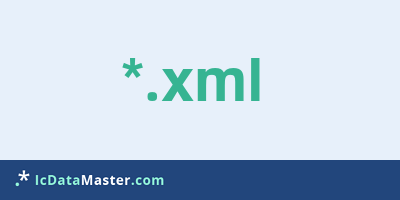Open XML files
-
Full nameXML Document Format
-
DeveloperN/A
-
Popularity
What is XML file?

XML files are files that contain data in Extensible Markup Language, a markup language similar to HTML. The data is stored in XML in element tags and subtags, allowing a hierarchy to be built. The tags can also record attributes.
More info
XML is mainly used for cross-platform data exchange, often you can also find XML files used as settings files in application programs or games. But also databases are possible with XML files.
XML files are coded like normal text and contain no binary data. They can be opened and read in any text editor, but such a view can be very unattractive to more complex XML files. Here we recommend an XML editor, such as the Microsoft XML Notepad. Here you get the structure of the element tags and subtags as a tree structure and shown the content of a selected element in a viewport.
Programs which can open a XML file
XML is mainly used for cross-platform data exchange, often you can also find XML files used as settings files in application programs or games. But also databases are possible with XML files.
XML files are coded like normal text and contain no binary data. They can be opened and read in any text editor, but such a view can be very unattractive to more complex XML files. Here we recommend an XML editor, such as the Microsoft XML Notepad. Here you get the structure of the element tags and subtags as a tree structure and shown the content of a selected element in a viewport.
Programs which can open a XML file
How to open file with XML extension?
Install EditiX or other program from the list
Most often resolving problems with opening XML files is very simple. Just install an appropriate program that supports such files. All of the listed programs support XML files, but may vary in offered function and purpose. Some programs may be capable only of viewing contents of XML files or offer file conversion options, but may not be capable of editing such files.
Set EditiX as the default program for opening XML files
It is possible that although a compatible program has been installed on user’s system, it is not used by the system to open it. This may happen because no default application was associated with this type of files. To associate XML files with given application, select "Open with" from drop-down menu (accessed by right-clicking on the file). Then select from the list the program or application you want to be used to open this type of file. If the EditiX applications is not on the list, select "Browse" option in order to manually locate the directory where EditiX has been installed.
Check the section that lists most common problems with XML files
Sometimes problems with opening XML files may not lie with the application itself, but can arise due to other causes, such as:
- File data is corrupted
- XML files has been not been completely download from the internet (only a part of the data has been downloaded)
- Currently used user account hasn’t been granted necessary privileges to open XML files (should that be the case, please contact your system administrator or IT specialist)
- XML file was being copied from a corrupted storage device and is incomplete or data is corrupted. (Copying files from unknown or untrusted sources should be conducted with great care as such files may contain malicious software, which can damage your system)















